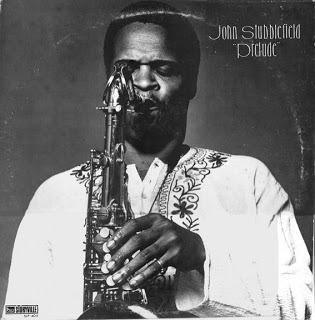John Stubblefield – Prelude (1978)
John Stubblefield – Prelude (1978)

01. "Song For One" (Stubblefield) - 7:18 02 "Little Prince" (Stubblefield) - 8:00 03 "Twelve for K.D." (Stubblefield) - 4:00 04 "If Only You Knew" (Gumbs) - 5:35 05 "What's Gonna Be Is Gonna Be" (Bridgewater) - 7:35 06 "Minor Impulse" (Stubblefield) - 7:10 John Stubblefield - tenor and soprano saxophone Cecil Bridgewater - trumpet and flugelhorn Onaje Allan Gumbs - keyboards Cecil McBee - bass Joe Chambers - drums Mtume – percussion (concussions)
Tenor-saxophonist John Stubblefield (who switches to soprano for one selection) explores six group originals with trumpeter Cecil Bridgewater, pianist Onaje Allen Gumbs, bassist Cecil McBee, drummer Joe Chambers and percussionist Mtume. For his debut as a leader, Stubblefield and the other musicians play what could be called free-bop, a style falling between the modern mainstream and the avant-garde, with fine results. Little unpredictable occurs but this is a good effort. ---Scott Yanow, AllMusic Review
John Stubblefield was one of the most highly respected jazz saxophonists of his generation. He played with legendary musicians across the jazz spectrum and left a legacy of quality studio work over more than three decades as a bandleader, studio musician, and go-to saxophonist for live performances and tours. He was inducted into the Arkansas Black Hall of Fame posthumously in 2007.
John Stubblefield was born on February 4, 1945, in Little Rock (Pulaski County), one of two children of John and Mabel Stubblefield. His father served in the U.S. Navy during World War II but was injured and discharged; back in Little Rock, he worked as a laborer, machinist, and painter while passing his love of music along to his son.
Stubblefield began studying piano after becoming interested in music while attending his church with his mother. She later discouraged his transition to saxophone and involvement with jazz, rhythm and blues (R&B), and other forms of what she called devil’s music. His first professional work came playing at clubs in the predominately black Ninth Street area in Little Rock, often sitting in with blues, R&B, and jazz musicians passing through town. Stubblefield’s first recording credit came at age seventeen with the R&B group York Wilburn & the Thrillers. He next spent a year on the road with soul singer Solomon Burke before enrolling at what is now the University of Arkansas at Pine Bluff (UAPB) to study music. While there, he led a jazz combo and established his pattern of playing with many musicians in a variety of styles, from gospel to modern jazz. He received his BS in music in 1967.
Stubblefield relocated to Chicago, Illinois, and joined the avant-garde jazz collective the Association for the Advancement of Creative Musicians (AACM). A year later, he played on Joseph Jarman’s album As If It Were the Seasons. Stubblefield studied with AACM co-founder Muhal Richard Abrams and the accomplished be-bop and hard bop saxophonist George Coleman Jr. While in Chicago, Stubblefield taught music in public schools and at the AACM School of Music. Stubblefield also continued his academic music training at Vandercook College in Chicago and at the University of Indiana in Bloomington.
Stubblefield moved to New York City in 1971, where he continued his work in the modern and avant-garde jazz scenes. He played with Charles Mingus soon after arriving in the city, but after a falling out, Mingus used his influence to make it difficult for Stubblefield to find work for a time. Over the next decade, Stubblefield played alongside such jazz giants as Miles Davis, Gil Evans, and fellow AACM alumnus Lester Bowie on international tours and at major festivals including the Montreux Jazz Festival. Stubblefield recorded at New York’s Town Hall with another former member of AACM, free jazz innovator Anthony Braxton. He also played with legendary Latin jazz performer and band leader Tito Puente, as well as Kenny Baron, McCoy Tyner, Freddie Hubbard, and the World Saxophone Quartet.
Stubblefield’s first album as a band leader was Prelude, recorded in 1976. Before joining the Mingus Big Band, Stubblefield went on to record several other albums as a band leader, including Midnight over Memphis (1979), Midnight Sun (1980), Confessin’ (1985), Bushman Song (1986), Countin’ on the Blues (1987), Sophisticatedfunk (1990), and Morning Song (1995). Stubblefield also taught music and participated as an instructor in the Jazzmobile program, a pioneering jazz education organization established in New York City in 1964. Stubblefield was inducted into the Arkansas Jazz Hall of Fame in 1998.
Stubblefield was described by fellow musicians to be a “preacher” as a soloist because of his deeply emotional style. Although his main instrument was tenor saxophone, he was also a respected soprano saxophonist. Stubblefield was sought after by traditional jazz, avant-garde, and big band groups.
Stubblefield was instrumental in preserving the legacy of renowned bassist and composer Charles Mingus, despite their professional differences earlier in his career. After Mingus’s death, his widow, Sue Mingus, founded a big band in Mingus’s honor. Stubblefield led the Mingus Big Band for over thirteen years and was one of the only members who had actually played with Mingus. He proved to be a dedicated band leader and steward of the Mingus legacy, once leaving his hospital bed toward the end of his life to conduct the band from his wheelchair to record three of his arrangements for the album I Am Three in October 2004.
Stubblefield died of prostate cancer on July 4, 2005. President Bill Clinton was among the many friends, fellow musicians, and fans who visited him in the hospital before his death. ---Joshua Cobbs Youngblood, encyclopediaofarkansas.net
download (mp3 @320 kbs):
Zmieniony (Piątek, 30 Kwiecień 2021 10:52)








